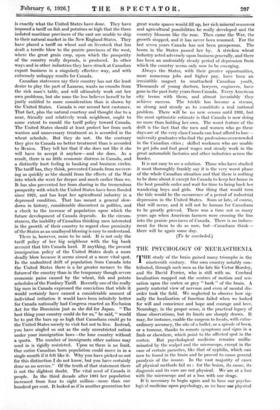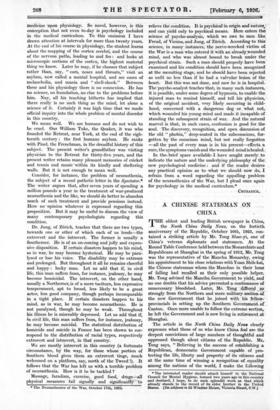THE PSYCHOLOGY OF NEURASTHENIA
THE study of the brain gained many triumphs in the nineteenth century. Our own country notably con- tributed, through such-men as the late Sir Victor Horsley, and Sir David Ferrier, who is still with us. Cerebral localization mapped out the centres of motion and sen- sation upon the cortex or grey " bark " of the brain. A purely material view of nervous and even of mental dis- order took the field. We neglected to observe how sig- nally the localization of function failed when we looked for will and conscience and hope and courage and love. Neurology, in the proper sense, is the practical legacy of those observations, but its limits are sharply drawn. It may, for instance, enable the surgeon to locate, with extra- ordinary accuracy, the site of a bullet, or a spicule of bone, or a tumour, thanks to remote symptoms and signs in a limb or elsewhere, which point to the affected spot in the cortex. But psychological medicine remains unillu- minated by the scalpel and the microscope, except in the case of certain parasites, like that of syphilis, 'which can now be found in the brain and be proved to cause general paralysis of the insane. In the vast majority of cases all physical methods fail us : for the lesion, its cause, its diagnosis and its cure are not physical. We are at a losd with the microscope and at a loss with our druigs. Iris necessary to 'begin again and to base our 'psycho- logical medicine upon psychology, as we base our physical medicine 'upon physiology. So novel, however, is this conception that not even to-day is psychology included in the medical curriculum. To this omission I have drawn attention at intervals for more than twenty years. At the end of his course in physiology, the student learns about the mapping of the cortex cerebri, and the course of the nervous paths, leading to and fro : and looks at microscopic sections of the cortex, the highest material thing we know. Later he may, if he chooses that subject rather than, say, " ears, noses and throats," visit an asylum, now called a mental hospital; and see cases of melancholia, and mania and " shell-shock." Between these and his physiology there is no connexion. He has no science, no foundation, no clue to the problems before him. Nay,, all his teaching hitherto has implied that there really is no 'such thing as the mind, let alone a science of it. Certainly it was high time that we made official inquiry into the whole problem of mental disorder in this country. . - < We mean well. We are humane and do not wish to be cruel. Our William Tuke, the Quaker, it was who founded the Retreat, near York, at the end of the eigh- teenth century : the first humane asylum. 'He ranks with Pinel, the Frenchman, in the -dreadful history of this subject: The present writer's grandfather was visiting physician to the Retreat for thirty-five years, and the present writer retains many pleasant memories of cricket and tennis and music ' within. its kindly and sheltering. walls. But it is not enough to mean well.
Consider, for instance, the problem of neurasthenia, the subject' of a recent pathetic letter 'in the Spectator.* The writer' argues that, after seven 'years of spending a million pounds- a year in the treatment of war-produced neurasthenia and the like, we should do better to abandon much of such treatment and 'provide pensions instead. Here no -opinion whatever iS expressed regarding this proposition. But it may be useful to discuss the view of many contemporary psychologists regarding this condition.
Dr. Jung, of Zurich, teaches that there are two types, towards one or other of which each of us 'tends—the extrovert and the 'introvert. The former is usually a Southerner. He is of an on-coming and jolly and expres- sive disposition. If certain disasters happen to his mind, as in war,- he may become hysterical. He may be' para- lysed or -lose his voice. The disability may be extreme and prolonged. But throughout it all he remains cheerful and happy : lucky man. Let us add that if, in civil life, this man suffers from, for instance, jealousy, he may become homicidal. The introvert, on the other hand, usually a Northerner, is of a more taciturn, less expressive temperament, apt to brood, less likely to be a great actor, less good company, though perhaps incomparable in a tight place. If certain disasters happen to his mind, as in war, he may become neurasthenic. He is not paralysed, though he may be weak. Throughout his illness he is miserably depressed. Let us add that if, in civil life,. this man suffers from, for instance, jealousy, he may become suicidal. The statistical distribution of homicide and suicide in France has been shown to cor- respond to the distribution of racial types, respectively extrovert and introvert, in that country.
We are mostly introvert in this country (a fortunate circumstance, by the way, for those whose portion of Southern blood gives them an extrovert tinge, much welcomed on a platform, say, north of the Tweed !). It follows that the War has left us with a terrible problem of neurasthenia. How is it to be tackled ?
Massage, faradism, exercise, good food, drugs—all physical measures fail signally and significanify to
* The Neurasthenics of the War, October 17th. 1925.
relieve the condition. It is psychical in origin and nature; and can yield only to psychical means. Here enters the; science of psycho-analysis, which we owe to men like, Freud, of Vienna, and Jung, of Ziirich. According to this! science, in many instances, the nerve-wrecked victim of the War is a man who entered it with an already wounded. mind, and who was almost bound to break under the psychical strain. Such a man should properly have been examined and his condition should have been recognized' at the recruiting stage, -and he should have been rejected as unfit no less than if he had a valvular" lesionof the heart. But this was not dime, and now 'he is in hospital. The-psycho-analyst teaches that, in many such instances, it is possible, under some degree of hypnosis, to enable the injured man to remind himself, and tell his physician, of the original accident, very likely _ occurring in child- hood, concerned with a dangerous dog or what not, which wounded his young mind and made it incapable 'of standing the subsequent strain of war. And the natural marvel. is that, in such cases, confession is good for .the soul. The discovery, recognition, and open discussion of the old " phobia," deep-seated in the subconscious, for- gotten by the conscious mind, but not really forgotten —all the past of every man is in his, present—effects. a cure, the symptoms vanish and the wounded mind is healed.
In the- brief space available,I_ have sought merely .to indicate the nature and the underlying philosophy of the new psychological medicine : and if the reader desires any practical opinion as to what we should now do, I refrain from a word regarding the appalling problem of the neurasthenics of the War, but I plead once again for psychology in the medical curriculum.* enorsenEn-,



























































 Previous page
Previous page